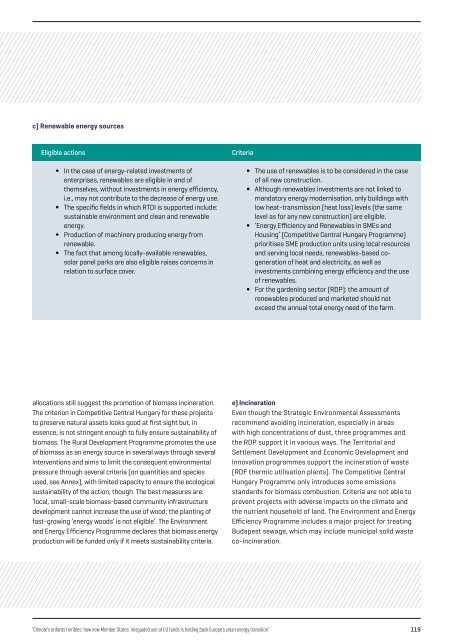ENFANTS TERRIBLES
enfants-terribles
enfants-terribles
Create successful ePaper yourself
Turn your PDF publications into a flip-book with our unique Google optimized e-Paper software.
c) Renewable energy sources<br />
Eligible actions<br />
• In the case of energy-related investments of<br />
enterprises, renewables are eligible in and of<br />
themselves, without investments in energy efficiency,<br />
i.e., may not contribute to the decrease of energy use.<br />
• The specific fields in which RTDI is supported include:<br />
sustainable environment and clean and renewable<br />
energy.<br />
• Production of machinery producing energy from<br />
renewable.<br />
• The fact that among locally-available renewables,<br />
solar panel parks are also eligible raises concerns in<br />
relation to surface cover.<br />
Criteria<br />
• The use of renewables is to be considered in the case<br />
of all new construction.<br />
• Although renewables investments are not linked to<br />
mandatory energy modernisation, only buildings with<br />
low heat-transmission (heat loss) levels (the same<br />
level as for any new construction) are eligible.<br />
• ‘Energy Efficiency and Renewables in SMEs and<br />
Housing’ (Competitive Central Hungary Programme)<br />
prioritises SME production units using local resources<br />
and serving local needs, renewables-based cogeneration<br />
of heat and electricity, as well as<br />
investments combining energy efficiency and the use<br />
of renewables.<br />
• For the gardening sector (RDP): the amount of<br />
renewables produced and marketed should not<br />
exceed the annual total energy need of the farm.<br />
allocations still suggest the promotion of biomass incineration.<br />
The criterion in Competitive Central Hungary for these projects<br />
to preserve natural assets looks good at first sight but, in<br />
essence, is not stringent enough to fully ensure sustainability of<br />
biomass. The Rural Development Programme promotes the use<br />
of biomass as an energy source in several ways through several<br />
interventions and aims to limit the consequent environmental<br />
pressure through several criteria (on quantities and species<br />
used, see Annex), with limited capacity to ensure the ecological<br />
sustainability of the action, though. The best measures are:<br />
‘local, small-scale biomass-based community infrastructure<br />
development cannot increase the use of wood; the planting of<br />
fast-growing ‘energy woods’ is not eligible’. The Environment<br />
and Energy Efficiency Programme declares that biomass energy<br />
production will be funded only if it meets sustainability criteria.<br />
e) Incineration<br />
Even though the Strategic Environmental Assessments<br />
recommend avoiding incineration, especially in areas<br />
with high concentrations of dust, three programmes and<br />
the RDP support it in various ways. The Territorial and<br />
Settlement Development and Economic Development and<br />
Innovation programmes support the incineration of waste<br />
(RDF thermic utilisation plants). The Competitive Central<br />
Hungary Programme only introduces some emissions<br />
standards for biomass combustion. Criteria are not able to<br />
prevent projects with adverse impacts on the climate and<br />
the nutrient household of land. The Environment and Energy<br />
Efficiency Programme includes a major project for treating<br />
Budapest sewage, which may include municipal solid waste<br />
co-incineration.<br />
‘Climate’s enfants terribles: how new Member States’ misguided use of EU funds is holding back Europe’s clean energy transition’ 119


